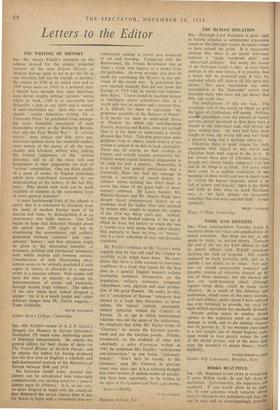Fairlie's review of A. J. P. Taylor's Struggle for Mastery
In Europe (Spectator, November 19) raises some interesting points of historical interpretation. He attacks the general editors for their choice of dates for The Oxford History of Modern Europe, and he attacks the author for having produced (for the first time in English) a scholarly and viell-documented analysis of the diplomacy.of Europe between 1848 and 1918. consciously seeking to revive past standards of art and learning. Compared with the Renaissance, the French Revolution was as clean a break with history as a stroke from the guillotine. An even stronger case may be made for continuing the History to the out- break of the recent war. A generation has now reached maturity that did not know the Europe of 1939 with its twenty-odd indepen- dent States. 1 have found in teaching history to intelligent senior schoolboys that, in a world split into an eastern and a western bloc, it is difficult for them to appreciate ' the perpetual quadrille of the Balance of Power.' It is harder for them to understand Stresa or Munich (to which the non-European Powers, America and Russia, were not invited) than it is for them to understand a world- division like Tilsit. This new generation seeks guidance from its elders; recent history is too serious a subject to be left to hack journalists. There are, of course, no final verdicts in history, and nobody (except, presumably Mr.
Fairlie) would expect historical judgements to be valid for half a century. Meanwhile, it
is a matter for general satisfaction that a University Press has had the courage to entrust a narrative of recent history to
scholars whose training has fitted them to assess the value of the great bulk of docu- mentary evidence. Sir Lewis Namier, Mr.
Wheeler-Bennett and Mr. Martin Wight have already raised contemporary history to an academic level far higher than that attained by writers who sought to explain the origins of the 1914 war thirty years ago. Nobody can escape the limited outlook of the age in which he lives; but history in which the bias is known is a safer guide than either history that purports to have no bias, or ' history ' that is a mere collection of racy and dramatic anecdotes.
Mr. Fairlic's criticism of Mr. Taylor's work suggests that he has not read the volume as carefully as he might have done. He com- plains that there is little account of economic conditions in a book that (again fin the first time in a general English history) collates invaluable statistical information on the population, military estimates, armament expenditure, coal, pig-iron and steel produc- tion of the great Powers. He seeks, in vain, for a ' conception of Europe' (whatever that means) in a book that illustrates, as never before, the typical realistic nineteenth- century optimism behind the Concert of Europe. In an age in which international relations was still the game of the aristocracy, he complains that when Mr. Taylor writes of ' Germany' he means the German govern- ment and not the German people. Finally, presumably on the evidence of what was admittedly a piece d'occasion written in 1945, he condemns Mr. Taylor's ' well-known anti-Germanism' as not being ' diplomatic history.' Don't let's be beastly to the Germans,' sang Mr. Coward, An glorious irony, nine years ago; it is a sobering thought that even reviews of serious work's of scholar- ship have now, apparently, to be written in the light of the London kind Paris agreements.
-Yours la,thfully. 5. l'%141flt










































 Previous page
Previous page